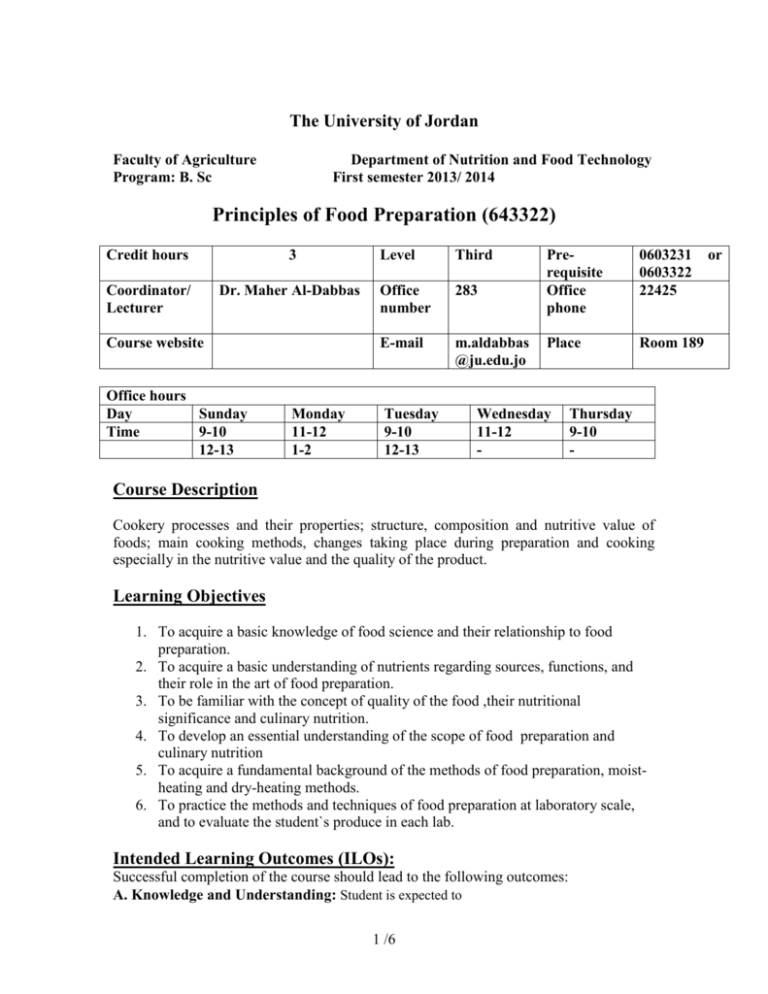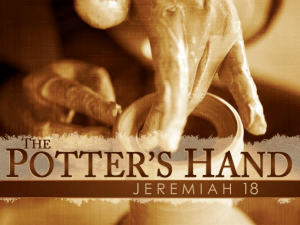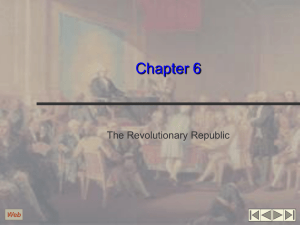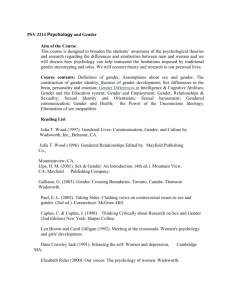Syllabus-Food preparation - Faculty Members Websites
advertisement

The University of Jordan Faculty of Agriculture Program: B. Sc Department of Nutrition and Food Technology First semester 2013/ 2014 Principles of Food Preparation (643322) Credit hours 3 Coordinator/ Lecturer Dr. Maher Al-Dabbas Course website Office hours Day Sunday Time 9-10 12-13 Monday 11-12 1-2 Level Third Office number 283 E-mail m.aldabbas @ju.edu.jo Tuesday 9-10 12-13 Prerequisite Office phone 0603231 0603322 22425 Place Room 189 Wednesday 11-12 - Thursday 9-10 - Course Description Cookery processes and their properties; structure, composition and nutritive value of foods; main cooking methods, changes taking place during preparation and cooking especially in the nutritive value and the quality of the product. Learning Objectives 1. To acquire a basic knowledge of food science and their relationship to food preparation. 2. To acquire a basic understanding of nutrients regarding sources, functions, and their role in the art of food preparation. 3. To be familiar with the concept of quality of the food ,their nutritional significance and culinary nutrition. 4. To develop an essential understanding of the scope of food preparation and culinary nutrition 5. To acquire a fundamental background of the methods of food preparation, moistheating and dry-heating methods. 6. To practice the methods and techniques of food preparation at laboratory scale, and to evaluate the student`s produce in each lab. Intended Learning Outcomes (ILOs): Successful completion of the course should lead to the following outcomes: A. Knowledge and Understanding: Student is expected to 1 /6 or A1- Describe the objectives of the study of food ingredients and preparation A2- Describe the structure, composition and nutritive value and the roles and uses of the different food groups and ingredients, as well as the changes upon storage and preparation. A3- To understand and recognize the science of food and nutrition and its relevance to the culinary arts. B. Intellectual Analytical and Cognitive Skills: Student is expected to B1- Choose the most appropriate method for the preparation and cooking different foods. B2- Select, store, prepare and handle foods appropriately. B3. Effect of processing techniques and ingredients on the quality of final products. C. Subject- Specific Skills: Students is expected to C1- Understand differences in food quality resulting from variations in preparation and/or ingredients. C2- Description recipes including the category, cooking time, techniques, equipments, instruction, description and nutrient analysis D. Transferable Key Skills: Students is expected to D1- Adopt safe and hygienic practices in food handling D2- Evaluate the quality of prepared foods using sensory methods. D3- Adopt the science and practice of healthy cooking ILOs: Learning and Evaluation Methods ILO/s Learning Methods Evaluation Methods A. Knowledge and Understanding (A1-A3) B. Intellectual Analytical and Cognitive Skills (B1B3) C. Subject Specific Skills (C1-C2) D.Transferable Key Skills (D1-D3) Lectures and Discussions Lectures and Discussions Exam, Quiz and assignments Exam, Quiz and assignments Lectures and Discussions Laboratory work Exam, Quiz and assignments Exam, Quiz and evaluation sheet for each lab. 2 /6 Course Contents Content Reference - Objectives of studying food ingredients and preparation - Cookery processes: dry and moist heat methods; microwave cookery - Methods of heat transfer to the food Brown A. Understanding Food: Principles and 1st and 2 rd Preparation.2008. 3 ed. Thomson Wadsworth, London. wks A1 B1 and 1st wk practical lab. D1 C1 and - Laboratory conduct, safety Week Laboratory Manual.( prepared by Prof. Salma Tukan) and hygiene responsibilities -Vegetables, fruits and legumes: classification, composition and nutritive value; uses, selection and storage; cooking methods and their effects -Demonstration: measuring techniques and food evaluation -Starches: Types, sources, uses and roles; gelatinization, gel setting and retrogradation; factors influencing cooking Brown A. Understanding Food: Principles and 3rd and 4th Preparation.2008. 3rd ed. Thomson Wadsworth, London. wks A2, B1, B2, B3, C1, D2 Laboratory Manual.( prepared by Prof. Salma 2nd wk Tukan) practical -Brown A. Understanding Food: Principles and 5th wk rd Preparation.2008. 3 ed. Thomson Wadsworth, London. - Potter & Hotchkiss. Food science. 1995. 5thEd. New York: Chapman & Hall. C1, D2, A1 A2, A3, B1, B2, B3, C1,C2 D3 3nd wk practical - Preparation of vegetables Laboratory Manual.( prepared by Prof. Salma Tukan) -Cereals: Types, structure, composition and nutritive value, cereal products; principles of cooking; storage Brown A. Understanding Food: Principles and 6th wk rd Preparation.2008. 3 ed. Thomson Wadsworth, London. - Potter & Hotchkiss. Food science. 1995. 5thEd. New York: Chapman & Hall - Dried legumes cookery and ILO/ s Laboratory Manual.( prepared by Prof. Salma Tukan) 4th wk table setting Eggs: Structure, composition and nutritive value; quality, deterioration, egg flaws and storage; properties and uses, egg dishes and hygienic handling Starches Brown A. Understanding Food: Principles and 7th wk rd Preparation.2008. 3 ed. Thomson Wadsworth, London. - Potter & Hotchkiss. Food science. 1995. 5thEd. New York: Chapman & Hall. Meat, poultry and fish: -Brown A. Understanding Food: Principles and Laboratory Manual.( prepared by Prof. Salma Tukan 5th wk 3 /6 8th and 9th C1, A1 D2, A1, A2, A3, B1, B2, B3, C1,C2 D3 A2, B1, B2, B3, C1,C2 D1, D2, D3 A1, A2, A3, B1, B2, B3, C1,C2, D1, D2, D3 A2, B1, B2, B3, C1,C2 D1, D2, D3 A1, A2, structure, composition and nutritive value; storage; factors affecting tenderness; cuts of meats and methods of cooking and changes upon cooking; offal and meat products - cereals cookery Preparation.2008. 3rd ed. Thomson Wadsworth, London. wk - Potter & Hotchkiss. Food science. 1995. 5thEd. New York: Chapman & Hall. A3, B1, B2, B3, C1,C2, D1, D2, D3 Laboratory Manual.( prepared by Prof. Salma Tukan 6th wk Fats and oils: Types, composition, sources, and crystals; selection, uses in food preparation and safe handling; storage -Brown A. Understanding Food: Principles and 10th wk rd Preparation.2008. 3 ed. Thomson Wadsworth, London. - Potter & Hotchkiss. Food science. 1995. 5thEd. New York: Chapman & Hall. A2, B1, B2, B3, C1,C2 D1, D2, D3 A1, A2, A3, B1, B2, B3, C1,C2, D1, D2, D3 A2, B1, B2, B3, C1,C2 D1, D2, D3 A1, A2, A3, B1, B2, B3, C1,C2, D1, D2, D3 A2, B1, B2, B3, C1,C2 D1, D2, D3 A1, A2, A3, B1, B2, B3, C1,C2, D1, D2, D3 - Eggs and custards Flour mixtures: main ingredients, their types and roles and substitution; main methods and changes during baking, causes of failure Meat and poultry cookery Milk and dairy products: Composition, nutritive value and care; types of milk and dairy products, uses in food preparation and changes during cooking Deep-fat frying Sugars and sweeteners: forms, types, properties and uses. Pastry and biscuits Laboratory Manual.( prepared by Prof. Salma Tukan 7th wk -Brown A. Understanding Food: Principles and 11th and rd Preparation.2008. 3 ed. Thomson Wadsworth, London. 12th wk - Potter & Hotchkiss. Food science. 1995. 5thEd. New York: Chapman & Hall. Laboratory Manual.( prepared by Prof. Salma Tukan 8th wk -Brown A. Understanding Food: Principles and 13th Preparation.2008. 3rd ed. Thomson Wadsworth, London. - Potter & Hotchkiss. Food science. 1995. 5thEd. New York: Chapman & Hall. Laboratory Manual.( prepared by Prof. Salma Tukan 9th wk Brown A. Understanding Food: Principles and 14th rd Preparation.2008. 3 ed. Thomson Wadsworth, London. - Potter & Hotchkiss. Food science. 1995. 5thEd. New York: Chapman & Hall Laboratory Manual.( prepared by Prof. Salma Tukan 10th wk 4 /6 A2, B1, B2, B3, C1,C2 D1, D2, D3 A1, A2, A3, B1, B2, B3, C1,C2, D1, D2, D3 A2, B1, B2, B3, C1,C2 D1, D2, Hot beverages: types and their preparation Cakes and cookies Yeast-leavened breads Brown A. Understanding Food: Principles and 15th wk rd Preparation.2008. 3 ed. Thomson Wadsworth, London. - Potter & Hotchkiss. Food science. 1995. 5thEd. New York: Chapman & Hall Laboratory Manual.( prepared by Prof. Salma Tukan 11th wk Laboratory Manual.( prepared by Prof. Salma Tukan 12th wk D3 A1, A2, A3, B1, B2, B3, C1,C2, D1, D2, D3 A2, B1, B2, B3, C1,C2 D1, D2, D3 A2, B1, B2, B3, C1,C2 D1, D2, D3 Learning Methodology The course will be structured in lectures, discussions, theoretical and practical. The course comprises overviews, from general understanding to expert knowledge on key topics, and learning is based on lectures as well as independent learning through exercises, assignments evaluation. Evaluation 1. Midterm exam (theory & practical) 2. Laboratory reports, quizzes and assignments 3. Final examination 30% 20% 50% Mon 25/11/2013 Main Reference/s: Brown A. Understanding Food: Principles and Preparation.2008. 3rd ed. Thomson Wadsworth, London. References: 1. Pellett, P and Shaderevian, S 1970. Food Composition Tables for Use in the Middle East. Beirut. 2. جامعة القدس. إعداد األطعمة وإدارة الوجبات.1002 . عصام،وجيهة وبشناق، محمد علي وخليل،حميض ،المفتوحة .عمان 3. Potter & Hotchkiss. Food science. 1995. 5thEd. New York: Chapman & Hall. 5 /6 Notes: Concerns or complaints should be expressed in the first instance to the module lecturer; if no resolution is forthcoming, then the issue should be brought to the attention of the module coordinator (for multiple sections) who will take the concerns to the module representative meeting. Thereafter, problems are dealt with by the Department Chair and if still unresolved the Dean and then ultimately the Vice President. For final complaints, there will be a committee to review grading the final exam. For more details on University regulations please visit: http://www.ju.edu.jo/rules/index.htm 6 /6









